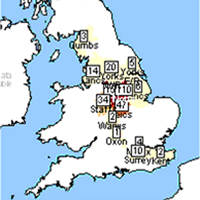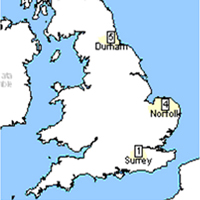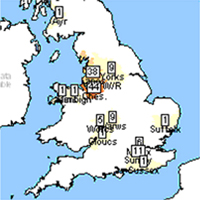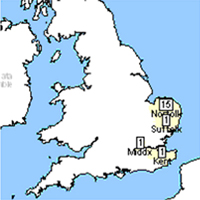|
|
"The Shards" — Newsletter of the Shard*low Study Group |
| « page 1 . . .44 45 46 47 48 49 page » |
Issue #45
Comment
Not having received any replies to my request in the last Newsletter for expressions of interest in the origin of the Shard*low
name I assume there is no interest and I shall not report this in the future. I shall also discontinue the attempt to restart the DNA Project, the main purpose of which was to establish the same thing.
The Battle of Crescy & the Siege of Calais
In May 1354 Sir Thomas de Shardelowe was granted exoneration from all demands to supply men-at-arms on the grounds of his
having served in the retinue of Thomas de Beauchamp at these battles. It is not thought that this would have been as a fighting
man, Thomas de Shardelowe was a Lawyer and it is difficult to imagine in what way he was of service. He later served two
terms as Attorney General 1366-1367 and 1378-1381 and was Coroner of Kent at the time of the Peasants Revolt (1381) when they seized a large quantity of official documents from Thomas’s house in Dartford and burned them.
John de Shardelow, son of Thomas’s elder brother Edmund, was given the same exoneration. This John was also in the legal
profession and inherited his grandfather’s title and estate as well as continuing the direct line of the name.
Feet of Fines for Suffolk
These documents list Court cases involving the ownership of land, the right to appoint a person to the post of Parish Priest and
similar disputes not of particular interest themselves but very useful in establishing relationships as people are often referred to
as “the wife of” or ”the son of”. For example in September 1434 Anna, Countess of Stafford was in dispute with John Shardelowe of Oclee and Margaret his wife of the Manor of Downham called Shardelowes.
|
||||||||||||||
Some time ago I purchased a program called “The British 19th Century Surname Atlas”, at the time I did not find it of particular use in our study but recently the question has come up of what were true variations i.e. used by several people over a period of time and what were due to there not being a right or wrong way of spelling it.
In particular the name Shard, was this a distinct name or simply an abbreviation of one of the others? This program listed a surprising number of variations of Shar*low* the majority which were for one person only and can, I suggest, be discounted as genuine mistakes. I have extracted three maps based on 1881 census showing the distribution of the three main variations of our study and one for the name Shard. Based on the number of people using it I am treating it as a separate name.
Shardalow can be shown to have evolved from Shardelow for an unknown reason in the 18th Century and has now almost died out, while Shardelow is more numerous abroad than it is in the U.K. Likewise the name Shadlow is known to be a deliberate change from Shardlow (see SHARDS #32).
Dr. Joseph Shardlow
In 1897 Joseph Shardlow graduated from the University of London as a Bachelor of Medicine, it is not known if he then did a post graduate course in Surgery but in the 1901 Census he was
working as Resident House Surgeon at Brighton Hospital in Sussex. Joseph was the second of son of John and Sarah Shardlow of Claycrosss, Derbyshire where John was a butcher and farmer.
| Owner of original | Originally created by Gerry Langford (d. 2017) |
| File name | shard/myfolio_01/45_issue.html |
| File Size | 10.79 KB |
| Media ID | 1201 |
| Dimensions | n/a |
| Folio version | v13.0.0.22 (28 Mar 2021) |
| Linked to | Albert George SHARDALOW |
| Back to top « page page » |






